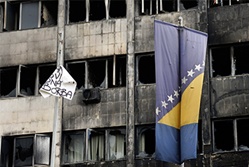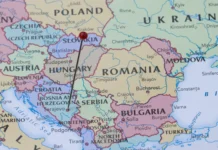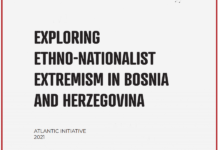Bosnia’s Future, the latest report on Bosnia and Herzegovina from the International Crisis Group, calls on the government of BiH to implement “fundamental reform,” urges greater political participation by Bosnian citizens, and recommends that the EU “welcome an immediate membership application” by the country. The report finds that there is little risk of the country returning to deadly conflict, but expresses concern that the Bosnian political elite controls all levels of government and most of the economy, “with no practical way for voters to dislodge it.” The report specifically highlights the BiH Constitution – enshrined in Annex 4 of the Dayton Peace Agreement – as “the heart of the problem” and says that “tensions created by constitutional schizophrenia are pushing BiH to the breaking point.” A departure from a system based on the rights of “constituent peoples” is also recommended, though authors of the report admit that it may take years of debate and experimentation to find a better basis for government. Ultimately, the report cites political culture as the source of many issues facing Bosnia, including social and economic woes, and encourages the citizens and community leaders of BiH to seek a new and more innovative path toward their future.
The Crisis Group makes the following Recommendations:
To set the country on a firm new constitutional foundation
To the government of Bosnia and Herzegovina (BiH), the Federation of Bosnia and Herzegovina (FBiH) and the Republika Srpska (RS):
1. Initiate a debate on fundamental reform.
2. Study elimination of the ten FBiH cantons and transfer of their responsibilities and revenue to municipalities and entity or state governments.
3. Set up, where possible, administrative districts for courts and police that match the boundaries of municipalities.
To build a responsive, transparent government and foster sustainable economic growth
To the citizens of Bosnia and Herzegovina:
4. Join political parties and take an active role in setting their agendas and electing their leaders.
5. Participate in civil society organisations whose aim is party democratisation.
To the international community, notably the EU, U.S. and donors:
6. Sponsor training programs and other initiatives to boost party membership and democratisation.
To support Bosnia’s evolution toward a modern federation on the path to EU and NATO membership
To the Presidency of Bosnia and Herzegovina:
7. Submit an application for EU membership.
8. Direct the defence ministry to prepare a Membership Action Plan for NATO and submit it on completion.
To the EU:
9. Welcome an immediate membership application, with a view to opening negotiations at the earliest practical date.
10. Support the reform effort by offering expertise on European models of feder-alism and community participation in states with multiple language areas.
To the members of the Peace Implementation Council (PIC), in particular the EU and U.S.:
11. Treat Bosnia as a normal country by closing the Office of the High Representative, dissolving the PIC and sponsoring a UN Security Council resolution welcoming these steps.
See the full Executive Summary here: http://bit.ly/1oKjJzS
See the full report (as a pdf) here: http://bit.ly/1k8w7p1
July 10, 2014








